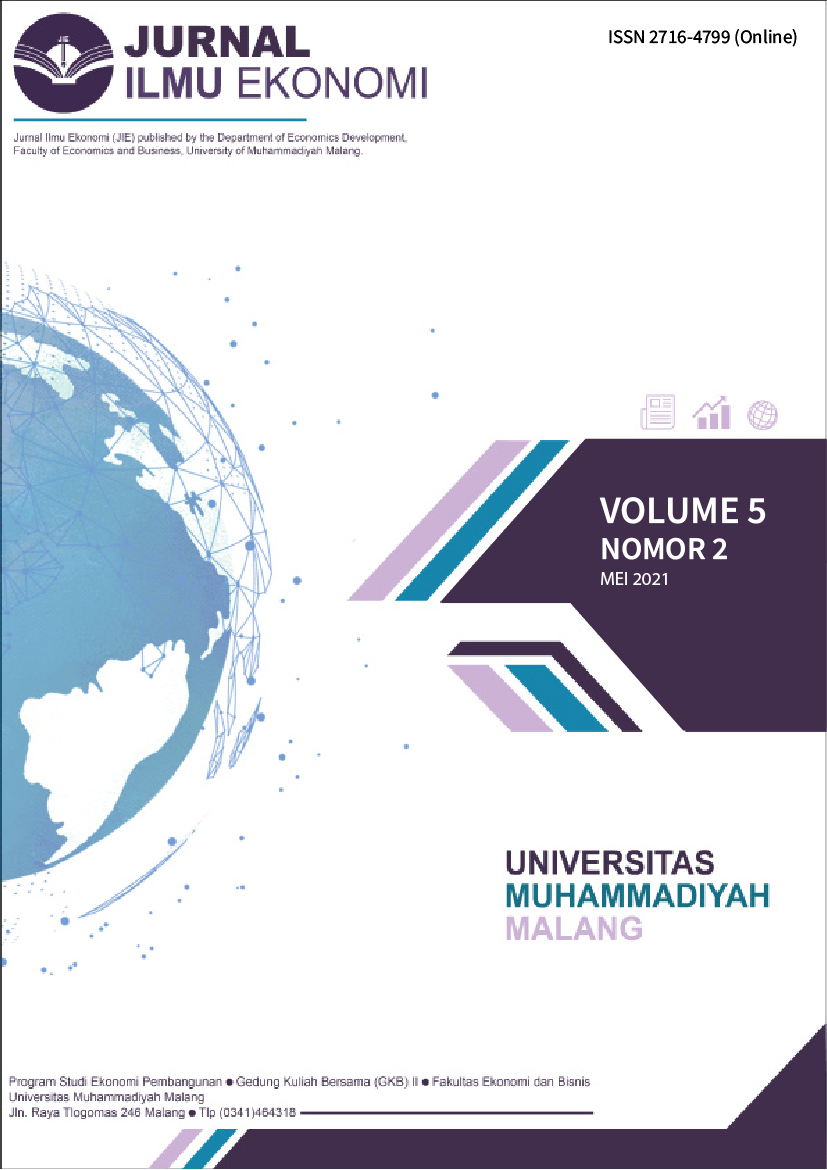Pengaruh Harga Minyak Dunia, Inflasi, Konsumsi Rumah Tangga terhadap Pertumbuhan Ekonomi Indonesia
DOI:
https://doi.org/10.22219/jie.v5i2.14101Keywords:
World oil price, Inflation, household consumption, Economic growth IndonesiaAbstract
This study aims to determine the effect of world oil prices, inflation, and household consumption on economic growth in Indonesia. This research is a type of descriptive research with a quantitative approach using the annual time series in 1988-2018. The analysis technique used in this study is multiple linear regressions with 31 samples. The results showed that both simultaneously and partially, world oil prices and inflation had a significant (negative) effect and household consumption had a significant (positive) effect on economic growth. Based on research results, the government can improve and build oil and gas infrastructure so that it can optimize oil production. This is very useful because it will reduce oil imports and also reduce the inflation rate. The government can also establish monetary policy and fiscal policy to maintain inflation stability. Other policies that can be done are by increasing the amount of goods produced so that the number of goods in circulation increases, setting maximum prices for several types of goods, and also making policies that can control the inflation rate so as to encourage domestic consumption due to price stability, so that consumption expenditure can be increase or can be stableDownloads
References
Afiftah, A. T. (2017). Analisis pengaruh pengeluaran konsumsi pemerintah dan pengeluaran konsumsi rumah tangga terhadap pertumbuhan ekonomi tahun 1988-2017. Dinamic : Directory Journal of Economic, 1(2), 11–22. https://doi.org/10.31002/dinamic.v1i1 Arifin, Y. (2016). Pengaruh harga minyak dunia, nilai tukar, dan inflasi terhadap pertumbuhan ekonomi Indonesia. Economics Development Analysis Journal 5, 2(4), 446–455. Diambil dari https://journal.unnes.ac.id/sju/index.php/edaj/article/view/22184 Ghalayini, L. (2014). The interaction between oil price and economic growth. Euro Journal, 13(January 2011), 128–140. Diambil dari http://www.eurojournals.com/MEFE.htm Handriyani, R., Sahyar, & Arwansyah. (2018). Analysis the effect of household consumption expenditure, investment and labor to economic growth: a case in province of North Sumatra. Studia Universitatis „Vasile Goldis” Arad – Economics Series, 28(4), 45–54. https://doi.org/10.2478/sues-2018-0019 Karim, Z. A., Karim, B. A., & Zaidi, M. A. S. (2012). Fixed investment, household consumption, and economic growth: A structural vector error correction model (SVECM) study of Malaysia. International Journal of Business and Society, 13(1), 63–76. Diambil dari https://mpra.ub.uni-muenchen.de/27146/ Ningtyas, M. S. A., Suhadak, & Hidayat, R. R. (2014). Pengaruh harga minyak dunia, harga emas, dan tingkat inflasi terhadap pertumbuhan ekonomi Indonesia studi pada Bank Indonesia periode tahun 2003-2012. Jurnal Administrasi Bisnis (JAB), 10(1), 1–8. Diambil dari administrasibisnis.studentjournal.ub.ac.id Nizar, M. A. (2012). Dampak fluktuasi harga minyak dunia terhadap perekonomian indonesia. Buletin Ilmiah Litbang Perdagangan, 6(2), 189–210. Diambil dari http://scholar.google.co.id/scholar_url?url=http://jurnal.kemendag.go.id/index.php/bipl/article/download/131/91&hl=id&sa=X&scisig=AAGBfm0ziWlnbdWyEwfhSBLo4TeyLCRMAA&nossl=1&oi=scholarr Saparuddin, M., Yolanda, S., & Sebayang, K. D. A. (2015). Effect invesment and the rate of inflation to economic growth in Indonesia. Trikonomika, 14(1), 87–95. Diambil dari http://journal.unpas.ac.id/index.php/trikonomika/article/view/595 Saymeh, A. A. F., & Orabi, M. M. A. (2013). The effect of interest rate, inflation rate, GDP, on real economic growth rate in Jordan. Asian Economic and Financial Review, 3(3), 341–354. Diambil dari http://www.researchgate.net/publication/281433184_The_effect_of_interest_rate_inflation_rate_GDP_on_real_economic_growth_rate_in_Jordan Septiawan, D. A., Hidayat, R. R., & Sulasmiyati, S. (2016). Pengaruh minyak dunia, inflasi, dan nilai tukar terhadap pertumbuhan ekonomi Indonesia ( Studi Pada Tahun 2007 - 2014 ). Jurnal Administrasi Bisnis (JAB), 40(2), 130–138. Diambil dari https://www.mendeley.com/catalogue/pengaruh-minyak-dunia-inflasi-dan-nilai-tukar-terhadap-pertumbuhan-ekonomi-indonesia-studi-pada-tahu/ Sudirman, M. A. (2018). Pengaruh konsumsi rumah tangga, investasi terhadap pertumbuhan ekonomi di provinsi Jambi. EKONOMIS : Journal of Economics and Business, 2(1), 81. https://doi.org/10.33087/ekonomis.v2i1.33 Syahtria, M. F., Suhadak, & Firdausi, N. (2016). Dampak inflasi, fluktuasi harga minyak dan emas dunia terhadap nilai tukar rupiah dan pertumbuhan ekonomi. Jurnal Administrasi Bisnis, 32(2), 59–68. Diambil dari http://administrasibisnis.studentjournal.ub.ac.id/index.php/jab/article/view/1265 Wiranthi, P. E. (2014). Analisis determinan pengeluaran konsumsi makro rumah tangga di Indonesia. Jurnal Ilmu Ekonomi, 3(2), 199–212. https://doi.org/10.15408/sigf.v3i2.2063
Downloads
Published
How to Cite
Issue
Section
License
Copyright (c) 2019 Jurnal Ilmu Ekonomi JIE

This work is licensed under a Creative Commons Attribution-ShareAlike 4.0 International License.
Authors who publish with this journal agree to the following terms:
- For all articles published in the JIE (Jurnal Ilmu Ekonomi), copyright is retained by the authors. Authors give permission to the publisher to announce the work with conditions. When the manuscript is accepted for publication, the authors agree to the automatic transfer of non-exclusive publishing rights to the publisher.
- Authors retain copyright and grant the journal right of first publication with the work simultaneously licensed under a Creative Commons Attribution-NonCommercial-ShareAlike 4.0 International License that allows others to share the work with an acknowledgement of the work's authorship and initial publication in this journal.
- Authors are able to enter into separate, additional contractual arrangements for the non-exclusive distribution of the journal's published version of the work (e.g., post it to an institutional repository or publish it in a book), with an acknowledgement of its initial publication in this journal.
- Authors are permitted and encouraged to post their work online (e.g., in institutional repositories or on their website) prior to and during the submission process, as it can lead to productive exchanges, as well as earlier and greater citation of published work (See The Effect of Open Access).
This is an open access article and licensed under a Creative Commons Attribution-NonCommercial-ShareAlike 4.0 International License








